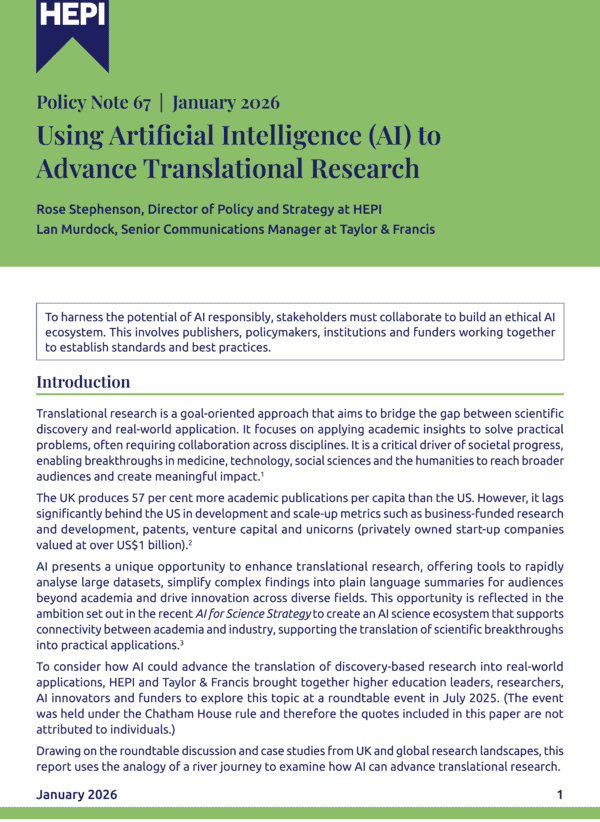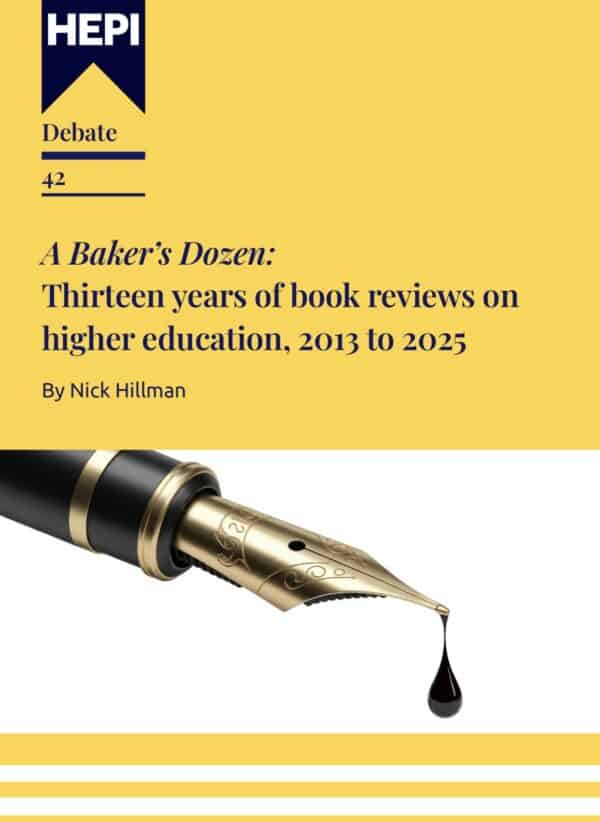The Curriculum and Assessment Review
This blog was kindly authored by Professor Sir Chris Husbands, who is a Director of Higher Futures and a HEPI Trustee. He was previously the Vice-Chancellor of Sheffield Hallam University.
The Final Report of the Curriculum and Assessment Review led by Becky Francis has been published. At 196 pages, with 16 pages of recommendations, it is a long and complex document – long and complex enough for early commentary to find quite different things in it. The Daily Telegraph headline was ‘five year olds to learn climate change under Labour’ (a Bad Thing). The Guardian headline was that the curriculum “should focus less on exams and more on life skills” (a Good Thing). The Times was more neutral, picking up on “more diversity — and fewer exams at GCSE” (which could be Bad Things or Good Things). The report’s length and attention to analytical detail (there are 478 footnotes and what is by comparison a brief analytical annex of 37 pages) make it difficult to summarise. But so do the granularity of the recommendations, which include such recommendations as that the Government reviews “how the PE Key Stage 1 to 4 Programmes of Study refer to Dance, including whether they are sufficiently specific” (p 106), or that it “makes minor refinements to the Geography Programmes of Study” (p 83). The detail and granularity are consistent with Becky Francis’s repeated statement that her review would be “evolutionary not revolutionary”, and there is enough here to keep curriculum leaders in schools and assessment policy wonks in awarding bodies busy for a very long time. But they make it difficult to see the underlying ideas.
But underlying ideas are there. From the perspective of higher education policy, there are probably three. The first is commitment to evolution rather than revolution. The school curriculum in five years’ time will not be unrecognisable from now. It will continue to be a subject-based, knowledge-led curriculum. Some of the more egregious aspects of the Gove reforms of a decade ago – the obsession with formal teaching of technical grammar such as ‘fronted adverbials’ (p 75), the overloading of history programmes of study (p 85) and the obsession with pre-twentieth century literature (p79) — are abandoned. There is greater emphasis on diversity and inclusion “so that all young people can see themselves represented” in what they learn (p 10). The review is conservative on assessment. The burden of assessment at 16 is to be reduced, suggesting that a reduction of 10% in GCSE examinations is feasible to increase time for teaching (p 135), but not changed in its overall form. Government “[should] continue to employ the principle that non-exam assessment should be used only when it is the only valid way to assess essential elements of a subject” (pp 138, 193), because “externally set and marked exams remain the fairest and most reliable method of assessment” (p 136).
This rebalancing, with less prescription, greater clarity between what is statutory and what is advisory and the reduced volume of GCSE (but not, unless I have missed it, A-level) assessment is the key to a second underlying idea which is an attempt to enhance teacher agency. This is cautious. The report is strong on pupil entitlement: this is a “national curriculum … for all our children and young people” (p180), which obviously means that it should apply to academies as well as local authority maintained schools, and that it should apply to all learners, not least because “learners with the lowest GCSE attainment (particularly grades 1 or 2) have fundamental knowledge gaps that extend to earlier key stages” (p163). But the report also recognises that any curriculum depends on those who teach it, and it recommends that the overhaul of programmes of study “involve… teachers in the testing and design of Programmes of Study as part of the drafting process” (p54). In all curriculum reform, the balance between prescription and latitude, between entitlement and flexibility is difficult. The report creates more space for teachers to make choices, but it retains a strong prescriptive core, and in some cases extends that: under current arrangements, Religious Education, although compulsory is outside the national curriculum. Francis wants the content brought into national requirements, and there will be hard fought arguments about RE.
The third key idea is about the 16-19 curriculum. The review stresses the key importance of level 3 learning and qualifications in “shaping life chances and supporting our economy” (p31), and it is sensibly less clear-cut than the interim report appeared to be on the differentiation between academic and vocational pathways at 16-19. Arguably, the report is agnostic about which Level 3 pathway students pursue, providing that more do access level 3. The report recommends abandoning the English Baccalaureate performance measure on the evidential grounds that “whilst well-intentioned [it has] not achieved” its goal and has “to some degree unnecessarily constrained students’ choices” (p10). The EBacc will be largely unmourned, except by its ministerial architects. The Review’s strong focus on progression is critical and may be its most important feature in the long term. Francis “thinks it is important that as many learners as possible who have achieved level 2 (five GCSEs at grade 4 or above or the equivalent) should be supported to study at level 3” (p141). This is obviously important for HE and is consistent with the Prime Minister’s Labour Party conference commitment to expand access to tertiary education. The Review unsurprisingly endorses the new ‘V-level’ qualification, although T-levels and V-levels refer to concepts (technology, vocational education) which are not levels of study. The Review remains committed to T-levels, and was probably required to be, but its evidence here on take-up (just 3% of learners, p141) is a reminder about just how far there is to go to establish T-levels. But the fundamental point is that the future of widening participation at all levels of tertiary education depends on improving progression from level 2 to level 3.
The Curriculum Review is a frustrating document to read. It is complex, thorough in its analysis of evidence and has clearly been hemmed in by policy priorities in several directions. It is dogged and detailed, well-meaning and intelligent, realistic about the world as it is and cautious about radical change. It offers a nip here, a tuck there and a tweak in other places. Arguably, this is Starmerism in the form of education policy. Natalie Perera, CEO of the Education Policy Institute, which I chair, called it “a broadly sensible direction of travel” and that is right. The initial reaction of the Opposition that the review rates “learning about climate change as more important than learning to read and write” is clearly absurd.
Many of the Review recommendations are for government and others to do further work. That means that the real impact of the Review depends less on the recommendations themselves than on the combination of political will and strategic implementation to make things happen. The government’s immediate response, which has been to accept some of the recommendations, suggests that there is scope for a good deal of frustration as thinking turns to implementation. Higher education academics and institutions care a lot about the ways that the compulsory education system prepares young people for entry to higher education – even if that is not its main function. What they get from the review is a largely recognisable curriculum landscape, conservatism about assessment approaches, a national entitlement to a more modernised and flexible curriculum, and, above all, a strong focus on pathways into post-16 study.







Comments
Ros Lucas BEd MA says:
A 21st Century Curriculum that ignores preparation for understanding how Further and HE, as well as an income can be obtained to live on, possibly from 16+ is neither modern or helpful.
If religious education is thought necessary, why not Career Management Education?
The UK is alone in much of the world continuing to use standsrdised testing at 16 to decide who has failed and likdly to become a NEET. With no alternative learning and assessment from 14+ that supports growing numbers of the neurodiverse, not including many suffering from undiagnosis, recognition or extra support required to achieve, too many will continue to be failed in the present inflexible, rigid and still outdated 2028 Curruculum.
Which other countries require 2 English or native speaking exams at 16? Where are the practical projects based on theory that link technology, science and digital aspects.
Evolution that ignores revolution and real modernisation, will lead to stagnation, more failures, drop outs, liw esteem and more NEETS…
Reply
Add comment